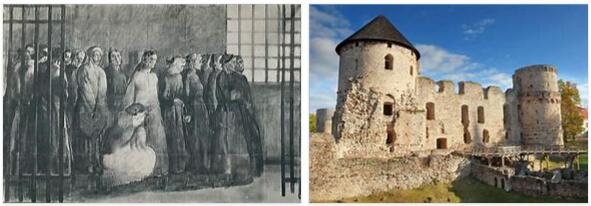Latvia is the heir of the two historical regions of Livonia and Courland, respectively from 1721 and from 1795 under the control of Russia, occupied by the Germans in the First World War. The awakening of a Latvian national consciousness, developed especially after 1905 and favored by the Russian revolution of 1917, led to the proclamation, on November 18, 1918, of the independent Republic of Latvia; the provisional government chaired by K. Ulmanis had to face the Bolshevik invasion and German attempts to stay in the country. Released in the early months of 1920, internal life was characterized by accentuated political instability: 10 governments succeeded one another from the entry into force of the 1922 Constitution until 1934, when Ulmanis carried out a coup d’état. Declared in vain neutral on 1 September 1939 (after the Molotov-Ribbentrop pact had recognized it as a Soviet area of influence), on 4 August 1940 the Latvia joined the USSR. Occupied by the Germans (1941-45), it returned to be part of the USSR at the end of the Second World War.
In August 1990 with a declaration defining the Latvia independent democratic republic and recalling the parliamentary constitution of 1922 into force, the Latvia dissolved its ties with the USSR, which recognized its independence in September; in the same month the country joined the UN. In the following years, Latvia was committed to redefining the structure of its economy, hitherto integrated with that of the USSR and, at the same time, to finding a new international position, new rules for its political order and new social balances. Of particular importance was the reaffirmation of a national identity compromised by the heavy attempt at Russification carried out by the USSR. The prevalence of radical nationalism led to severe discriminatory measures against Slavic minorities and to growing tensions not only with Russia, but also with the European Community. At the same time, Latvia undertook to strengthen ties with the other Baltic republics and with the countries of Western Europe: member of the Council of States of the Baltic Sea since 1992 and of the Council of Europe since 1995, in the same year she applied for membership of the European Union, which she entered in 2004; in the same year it joined NATO, in 2007 it joined the area Schengen. Also in 2007, the signing of a treaty with Russia for the mutual recognition of borders ended a long-standing territorial dispute.
Internally, the nationalist alignment that had brought the country to independence has undergone repeated splits and political life has been characterized by marked instability and fragmentation, which is expressed in the succession of various center-right governments that have pursued a liberal economic policy, with privatizations and measures aimed at the gradual dismantling of the social security system. V. Vike-Freiberga, elected in 1999, was the first woman to win the office of President of the Republic in a Central-Eastern European country; confirmed in 2003 as the culmination of her reform and pro-European battles, she remained in office until 2007, when she was succeeded by V. Zatlers. In 2009, popular protests and riots followed the spread of the economic crisis, which resulted in a 10.5% drop in GDP, the highest in the European Union. In power since March of the same year, despite the severe anti-deficit measures imposed to restart the economy, the center-right government led by Prime Minister V. Dombrovskis, reconfirmed in the consultations of Oct. 2010, was unable to curb the collapse of GDP. In the early legislative elections of Sept. 2011, held by decision of, the opposition Center of Harmony party won with about 29% of the votes, but did not obtain the majority that would have allowed it to form the new government. The parliamentary consultations held in October 2014 sanctioned the victory of the center-right coalition of Prime Minister Latvia Straujuma, in office since January of the same year and a member of the Unity party, which won 61 seats out of 100, while the pro-Russian Centro party of the Harmony went 23% of the preferences. In December 2015, Prime Minister Straujuma resigned due to the internal divisions of the center-right coalition in power and in the following February the Parliament gave its confidence to a new executive chaired by M. Kučinskis, while in the legislative elections held in ‘ October 2018 the pro-Russian Social Democratic Party Harmony was the winner with 19.9% of the votes, formed by the confluence between the National Harmony Party and some minor political movements already part of the Centro dell’Armonia coalition with the Latvian Socialist Party, followed from populist formations Who does the state belong to? (Kam pieder valsts? KPV), which won 14% of the votes, from the New Conservative Party (Jaunā konservatīvā partija – JKP), which won 13.6% of the votes, and the center-right coalition New Unity (Jaunā Vienotība, JV). In January 2019, after a long stalemate, a government agreement was concluded between JKP, KPV and JV, whose representative AK Kariņš assumed the post of prime minister of the country, taking over from Kučinskis.
On 1 January 2014, the Latvia joined the euro area.
LANGUAGE
Latvian is an Indo-European language, divided into Upper Latvian, Middle Latvian and Tahmi, belonging to the group of Baltic languages, within which it shows characters of greater affinity with Lithuanian. It retains a system of secondary musical accents, but presents, unlike Lithuanian, an initial expiratory accent. The first literary documents, of a religious nature, date back to the 16th century. The spelling, which once used Gothic characters, was renewed in 1921.
